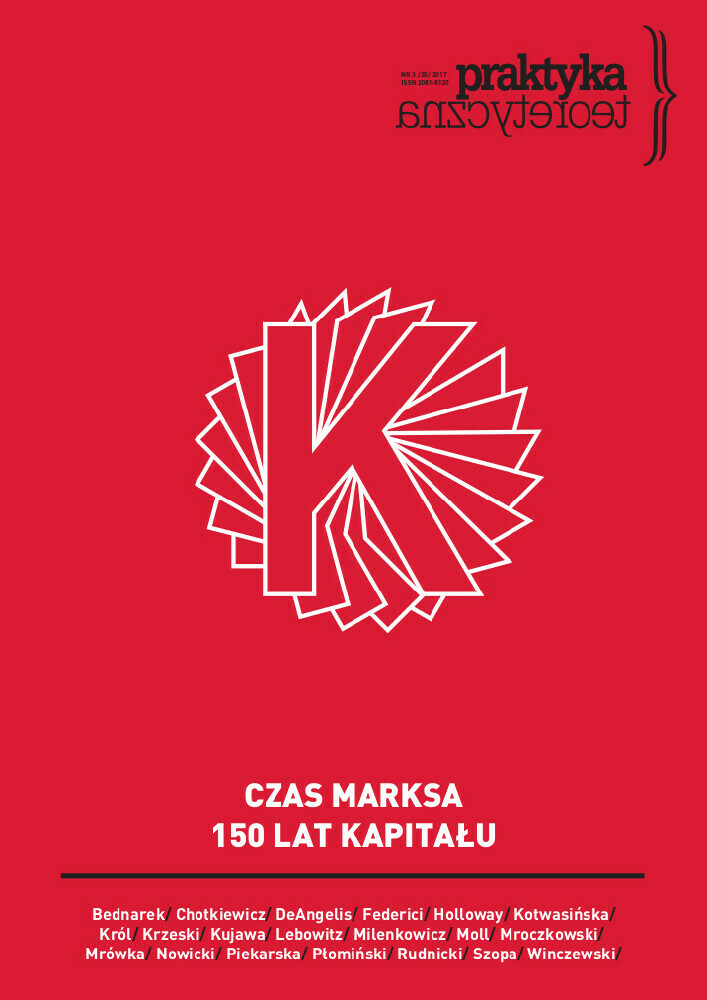Abstract
Contrary to received opinion, Marx’s analysis in Capital does not start from the commodity, it starts from wealth. This has enormous theoretical and political implications.References
Adorno, Theodor W. 1986. Dialektyka negatywna. Tłum. Krystyna Krzemieniowa. Warszawa: Państwowe Wydawnictwo Naukowe.
Bonefeld, Werner. 2014. Critical Theory and the Critique of Political Economy: On Subversion and Negative Reason. London: Continuum.
Cleaver, Harry. 2011. Polityczne czytanie Kapitału. Tłum. Iwo Czyż. Poznań: Wydawnictwo Bractwo Trojka.
De Angelis, Massimo. 2007. The Beginning of History: Value Struggles and Global Capital. London: Pluto Press.
Gunn, Richard. 1992. „Against Historical Materialism: Marxism as a First-order Discourse”. W Open Marxism, Volume 2: Theory and Practice, pod red. Werner Bonefeld, Richard Gunn i Kosmas Psychopedis. London: Pluto Press.
Hardt, Michael i Antonio Negri. 2012. Rzecz-pospolita. Tłum. Praktyka Teoretyczna. Kraków: Korporacja Ha!art.
Harvey, David. 2017. Przewodnik po Kapitale Karola Marksa. Tłum. Krystian Szadkowski. Poznań: Wydawnictwo Ekonomiczne Heterodox.
Hegel, Georg Wilhelm Friedrich. 2002. Fenomenologia ducha. Tłum. Światosław Florian Nowicki. Warszawa: Fundacja Aletheia.
Heinrich, Michael. 2008. Wie das Marxsche Kapital lesen?: Hinweise zur Lektüre und Kommentar zum Anfang von Das Kapital. Stuttgart: Schmetterling Verlag.
Heinrich, Michael. 2012. An Introduction to the Three Volumes of Karl Marx’s Capital. Tłum. Alex Locascio. New York: Monthly Review Press.
Holloway, John. 1991. „The State and Everyday Struggle.” W The State Debate, pod red. Simon Clarke. Basingstoke: Palgrave-Macmillan.
Holloway, John. 2010a, Change the World without Taking Power, New Edition. London: Pluto Press.
Holloway, John. 2010b. Crack Capitalism. London: Pluto Press.
Lukács, György. 1988. Historia i świadomość klasowa. Tłum. Marek Siemek. Warszawa: Państwowe Wydawnictwo Naukowe.
Marks, Karol. 1951. Kapitał, tom 1. Warszawa: Książka i Wiedza.
Marks, Karol. 1953. Grundrisse. Berlin: Dietz Verlag.
Marks, Karol. 1961. Zur Kritik der Politischen Ökonomie, in Marx-Engels-Werke, Volume 13. Berlin: Dietz Verlag.
Marks, Karol. 1985. Das Kapital. Band 1. Berlin: Dietz Verlag.
Marks, Karol. 1986. Zarys krytyki ekonomii politycznej. Tłum. Zygmunt Jan Wyrozembski. Warszawa: Książka i Wiedza.
Marks, Karol. 1966. „Przyczynek do krytyki ekonomii politycznej”. W Marks, Engels, Dzieła, t. 13. Warszawa: Książka i Wiedza.
Nasioka, Katerina. 2014. Ciudad e insurrección en el siglo XXI. Espacialización y subjeti-vación en las revueltas urbanas de Oaxaca (2006) y Atenas (2008). Praca doktorska, Instituto de Ciencias Sociales y Humanidades, Benemérita Universidad Autónoma de Puebla, Puebla.
Perelman, Michael. 2011. The Invisible Handcuffs of Capitalism: How Market Tyranny Stifles the Economy by Stunting Workers. New York: Monthly Review Press.
Postone, Moishe. 1996. Time, Labor, and Social Domination: A Reinterpretation of Marx’s Critical Theory. Cambridge: Cambridge University Press.
Rozitchner, León. 2003. Freud y los Problemas del Poder. Buenos Aires: Losada.
Sohn-Rethel, Alfred. 1978. Intellectual and Manual Labour: A Critique of Epistemology. Tłum. Martin Sohn-Rethel. London: Macmillan and Co. Ltd.
Tischler, Sergio. 2014. „Detotalization and Subject: On Zapatismo and Critical Theory.” South Atlantic Quarterly 113(2): 327–38.
Vaneigem, Raoul. 2012. Lettre à mes enfants et aux enfants du monde à venir. Paris: cherche midi.
Wright, Steve. 2002. Storming Heaven: Class Composition and Struggle in Italian Autonomist Marxism. London: Pluto Press.
License
“Theoretical Practice” seeks to put into practice the idea of open access to knowledge and broadening the domain of the commons. It serves the development of science, thinking and critical reflection. The journal is published in open-access mode under the CC-BY-NC-SA 4.0 license (detail available here: http://creativecommons.org/licenses/by-nc-sa/4.0/). Articles published in the journal may be freely distributed, stored, printed and utilized for academic and teaching purposes without restrictions.
They should not be, however, used for any commercial purposes or be reconstructed into derivative creations. Access to the journal may not be limited or offered for a fee by any third party.
Prospective authors are obliged to fill in, sign and send back the publishing contract compliant with the CC licencing. [PL.pdf, PL.doc, EN.pdf,EN.doc].
According to this contract, authors grant the journal a non-exclusive right to publish their work under the creative commons license (CC-BY-NC-SA 4.0) without any financial obligation on both sides of the contract.
Before submission authors should make sure that derivative materials they use are not protected by copyright preventing their non-commercial publication. Authors are responsible for any respective copyright violations.
